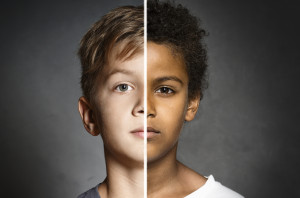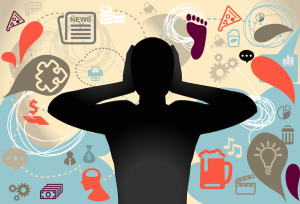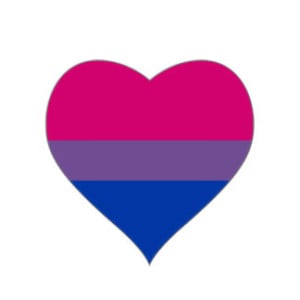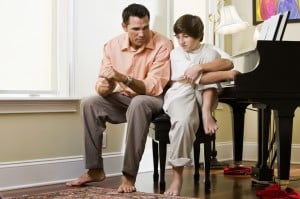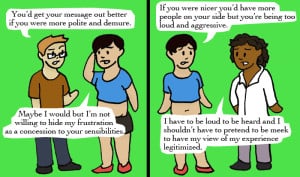
Source: iStock
For as long as I could remember, I’ve always had a terrible temper.
I never knew where my anger came from and assumed that I was just an “angry person.” It wasn’t until I began seeing a therapist that I realized labeling myself with such harsh words was not only detrimental to my psyche, but was flat-out incorrect.
My therapist informed me that there is a difference between being an “angry person” and “a person who gets angry.”
The distinction was mind-blowing to me.
As I began unpacking a childhood that I had repressed, it suddenly made sense where my anger came from. It wasn’t an inexplicable negative character trait that fully encompasses who I am. It had a source – and that source was years of unprocessed trauma due to mental and verbal abuse.
I had always avoided processing my traumatic childhood because I felt like I was usurping my “personal responsibilities.” I bought into the narrative that any choice people made in the present was uninfluenced by anything from the past.
But the more I learned about myself from my therapist, the more I realized that the things that happened in my formative years largely shaped who I am today.
This isn’t to say that my past excuses my present actions; it’s to illuminate how invaluable it was for me to figure out my origin story in order to have a better grasp on why I act and think the way I do.
Although the type of abuse varies from person-to-person, all survivors of child abuse deal with a certain amount of trauma whether consciously or unconsciously.
And even though I feel better knowing where my negative emotions come from, it doesn’t mean that things are easy. Self-betterment is not a quick fix. It’s a long process. For some people, it takes an entire lifetime.
For me, I practice self-compassion by writing down affirmations to remind myself that I’m a worthwhile person. Since I’ve spent the vast majority of my life habitually criticizing myself, these affirmations don’t come naturally. I have to repeat these reminders to myself on a daily basis in order for them to sink in.
Although it’s still a challenge to realize my self-worth, these affirmations have helped me get through some difficult times.
Here are some reminders that I have to constantly tell myself, and I hope these reminders can help you, too.
1. You Deserved a Better Childhood
I always had trouble accepting the idea that I deserved to be treated well for simply existing.
My instinct is to ask, “What did I ever do to be treated well? What did I ever do to deserve love?”
The idea of inherent value was lost on me because I was constantly reminded how many sacrifices my parents made which, in turn, made me feel like a huge burden. Therefore, I didn’t feel like I had value and didn’t deserve love.
But the truth is, I didn’t choose to be born. None of us did. I believe that if you make the decision to have a child, the least you could do is take care of who you created.
As I began telling my therapist stories about my childhood, it occurred to me that I had blamed myself for my own abuse.
My self-blame aligned with my misguided internalized belief that I was solely responsible for all of my actions.
However, I realized over time that the abuse I received as a child couldn’t be my fault because I was a child, and children do not innately know how to take care of themselves. It is the adult’s responsibility to teach children about the world, to teach children about right from wrong, and to teach children how to be compassionate and empathetic.
If adults don’t do this, then children will have to fend for themselves and figure out how to navigate the world even though they were never given the proper tools to do so.
If you struggle with blaming yourself for your past, or if you feel like a burden because of what happened in childhood, remember this: You deserved a better childhood. Period.
You deserved to have someone raise you. You deserved to have someone teach you. And you certainly did not deserve to be abused by the people who are supposed to be your protectors.
It is always the adult’s responsibility and never the child’s to raise children into being future adults. Adults are the ones who are supposed to know better.
2. Be Compassionate and Patient with Yourself
Since child abuse happens at such an early age, self-blame can become a deep-seated belief.
Dismantling such ingrained beliefs of self-blame takes a long time. But the worst thing you can do when these negative feelings come to the surface is to further chastise yourself for feeling negatively or falling into old thought patterns.
When I feel depressed, I have an impulse to tell myself to “get over it.” But when I put pressure on myself that way, it doesn’t speed up the recovery process. It actually hinders the recovery process because I’m being incessantly harsh on myself.
Constantly criticizing yourself relies heavily on negative reinforcement.
We’re taught that the toxic idea of “tough love” actually has merit, but I believe it does significant damage. My abusers would tell me that they yelled at me because they loved me. They would yell at me to get better grades or to get a better paying job, otherwise I’d be a huge disappointment.
Since they’re the ones who put these negative voices in my head, I began saying these things to myself. Their negative words have become mine.
What they failed to realize is that none of their yelling ever helped me to achieve more. All it did was make me feel guiltier about not living up to their expectations.
Thinking so negatively about myself put me in constant depressive states which left me largely debilitated. Not only was the criticism damaging; it was also counterproductive.
In the past couple of years, I’ve surrounded myself with friends who give me positive reinforcement, which is something I’m still getting used to. Through their love and support, in the past two years, I’ve accomplished more internally and externally than I ever have in my life.
When I’m upset or depressed, they don’t shame me and tell me that I’m weak. They don’t force me out of bed against my will. They don’t tell me to “get over it.”
They’re patient and compassionate with me. And just knowing that someone cares for me is enough for me to go on at least another day.
I’ve since tried my best to use the same compassionate language on myself as my loved ones have used on me.
I fail a lot of the time because over twenty years of internalized self-blame and hatred is a lot to dismantle – but every day, it gets a little easier. And every time I fail, I try my best to forgive myself and remind myself that I’m a valuable person no matter what.
I hope that you can be compassionate with yourself as well, and I hope that you can be patient with yourself when you fall into old habits.
You are bound to fall back into old thought patterns, and it’s okay and understandable when and if you do. Either way, you are still valuable.
3. You Are Still Loved, Even When It’s Uncomfortable to Accept Love from Others
My status quo as a child was feeling miserable inside.
Since there was no other context that I could draw from, I felt like this internal depression was “normal.” I had no idea that what I endured was abuse until a professional informed me. It never occurred to me that other children weren’t treated the same way I was. As a child, I could only draw from my very limited experience in a small household.
Consequently, the negative emotions I felt inside every day became homeostasis.
Since the feelings of negativity and depression felt “normal,” I would subconsciously seek out people who would treat me with similar abuse so that I could recapture my misguided perceptions of normalcy.
This trend continued until 2012 when I began cognitive behavioral therapy, and I started realizing that people who I thought were my friends had been mistreating me for years.
For the first time in my life, I gained some self-esteem and became less patient with being mistreated. It was good for my overall health, but it was actually a much harder experience than I realized it would be.
When I started surrounding myself with friends who would show me love and lift me up, I resented them for making me feel happiness because I felt like I didn’t deserve to feel good inside. I didn’t feel like I was a good person.
I also hated how different this emotion felt. It wasn’t that happiness was an unpleasant feeling; it was that I was experiencing a strong feeling that I was unfamiliar with and that emotion terrified me.
This is why I have an impulse to push people away who show me affection. I’d rather feel misery since it’s more comfortable and familiar.
Even though my feelings are valid, it doesn’t mean that my emotions correspond with reality. My thinking that I’m unloved or undeserving of happiness comes from a cognitive distortion that my brain was patterned to believe.
And even with the knowledge that these negative thoughts are cognitive distortions, it is difficult – if not impossible – to dismantle this narrative overnight.
It takes a lot of practice to retrain people’s thoughts because the self-hate is so ingrained in many abuse survivors’ psyches that their thoughts about their self-hatred become automatic.
So every day, I have to give myself some constant reminders:
- Just because I feel unloved doesn’t mean that I am.
- Just because I have negative thoughts doesn’t mean they’re true.
- Just because I believe something negatively about myself now doesn’t mean that I always will.
The feeling of being unloved by others is a projection that comes from not loving myself. The moments when I believe that others can love me only occur when I feel love for myself.
If you are struggling similarly, try to remind yourself that you are loved and you are allowed to love yourself. And even if that’s a hard concept to grasp, it’s okay if it doesn’t always sink in. Reminders of self-love are hard to internalize at times.
It’s okay if you can’t always accept that you’re loved. If you were abused, it was bound to be hard. That isn’t your fault.
You are still loved anyway.
4. Forgive Yourself for Hurting Others
“Who taught you your morals?” my therapist asked me.
The question seemed very strange to me, and I let out a nervous laugh. “Uh, what do you mean? I just know what my morals are.”
“But who taught them to you?” she asked again.
It wasn’t until that moment when I realized that my morals did not come from an inexplicable force in the universe. They came from my parents. They taught me what was acceptable and unacceptable behavior through their actions and their words.
The malleability of children is not something that should be glossed over.
I always saw my father screaming when something didn’t go his way. He’d lose his temper and throw things. Before I knew it, I was a teenager screaming at people and throwing things. Without consciously realizing it, I began emulating his abusive behaviors and actions.
To be clear, this does not excuse my abusive behavior. This is merely explaining where it comes from. I believe that before one can begin dismantling abusive tendencies, one must know its origins.
If all you were ever taught was how to be abusive, it’s almost impossible to not pick up at least a few of these tendencies.
For me, one of the hardest parts about being a survivor of child abuse is dealing with the guilt of knowing that I am a verbally abusive person at times. This knowledge is what begins a cycle of self-hate where I begin self-destructive behavior and push people away.
My thought process is, “This is who I really am. I’m an abuser. I don’t deserve forgiveness. I resent you for forgiving me. I’m a bad person.”
But the only thing this self-criticism really does is create more explosive and abusive behavior. Reminding myself that I’m a “bad person” does nothing to absolve my actions, nor does it help the people that I’ve hurt. All it does is continue the vicious cycle.
Though it’s seemingly counterintuitive, the best thing I can do to stop emulating my abuser’s actions is by owning responsibility for what I did while also forgiving myself.
I need to remind myself that I am not a “bad person” because I did something I was taught to do. It means that I can be a good person who does bad things.
This does not mean that anybody you’ve hurt has to forgive you. Other people are separate entities with feelings and emotions, and if you’ve hurt somebody that won’t forgive you, that is their right. You can respect that right and even see why they wouldn’t forgive you, and you can feel great remorse for what you’ve done.
But the point is, once you begin overly punishing yourself, you are only increasing the likeliness that you will do it again.
Self-forgiveness is a very tough skill to practice.
If you’ve always been mistreated with harsh language, you will likely repeat that harsh language to yourself without realizing it. Making the conscious decision to realize that you deserve to feel loved even if you’ve done what you feel are horrible things is a huge step in the recovery process. It’s rarely easy, but it’s worthwhile for yourself and for your close ones.
You can do some bad things and still be a good person. It isn’t your fault that you were taught otherwise. It’s okay to forgive yourself. Doing so can free you up to focus instead on treating others respectfully.
***
Unpacking my trauma was one of the hardest things I’ve ever had to do in my whole life.
These reminders that I’m writing are as much for me as they are for you. I believe that the way to minimize pain and abuse is through self-care, self-love, and compassion.
And I believe that everybody deserves to be reminded of that whenever they need to hear it.
[do_widget id=’text-101′]
Robin Tran is a Contributing Writer for Everyday Feminism. She is a standup comedian and blogger, and she holds a BA in English from UC Irvine. In early 2015, Robin came out as transgender woman and has written about her firsthand experiences ever since. She has performed at the Improv, Mad House Comedy Club, and the Comedy Palace, and her articles have been published in xoJane and Time.com.
Search our 3000+ articles!
Read our articles about:
Our online racial justice training
Used by hundreds of universities, non-profits, and businesses.
Click to learn more





